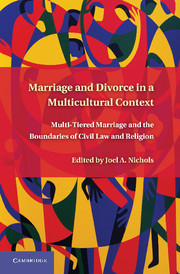 Marriage and Divorce in a Multi-Cultural Context
Marriage and Divorce in a Multi-Cultural Context Book contents
- Frontmatter
- Contents
- Detail Contents
- About the Editor
- List of Contributors
- Preface
- Permissions
- Introduction
- 1 Multi-Tiered Marriage
- 2 Pluralism and Decentralization in Marriage Regulation
- 3 Marriage and the Law
- 4 Unofficial Family Law
- 5 Covenant Marriage Laws
- 6 New York’s Regulation of Jewish Marriage
- 7 Political Liberalism, Islamic Family Law, and Family Law Pluralism
- 8 Multi-Tiered Marriages in South Africa
- 9 Ancient and Modern Boundary Crossings Between Personal Laws and Civil Law in Composite India
- 10 The Perils of Privatized Marriage
- 11 Canadian Conjugal Mosaic
- 12 Marriage Pluralism in the United States
- 13 Faith in Law? Diffusing Tensions Between Diversity and Equality
- 14 The Frontiers of Marital Pluralism
- Index
- References
13 - Faith in Law? Diffusing Tensions Between Diversity and Equality
Published online by Cambridge University Press: 05 November 2011
- Frontmatter
- Contents
- Detail Contents
- About the Editor
- List of Contributors
- Preface
- Permissions
- Introduction
- 1 Multi-Tiered Marriage
- 2 Pluralism and Decentralization in Marriage Regulation
- 3 Marriage and the Law
- 4 Unofficial Family Law
- 5 Covenant Marriage Laws
- 6 New York’s Regulation of Jewish Marriage
- 7 Political Liberalism, Islamic Family Law, and Family Law Pluralism
- 8 Multi-Tiered Marriages in South Africa
- 9 Ancient and Modern Boundary Crossings Between Personal Laws and Civil Law in Composite India
- 10 The Perils of Privatized Marriage
- 11 Canadian Conjugal Mosaic
- 12 Marriage Pluralism in the United States
- 13 Faith in Law? Diffusing Tensions Between Diversity and Equality
- 14 The Frontiers of Marital Pluralism
- Index
- References
Summary
How should a democratic state and its public law system respond to claims by members of religious minorities seeking to establish private faith-based arbitration tribunals to resolve family disputes? Classic liberals and civic republicans would have had a quick response to such a query. They favored a strict separation between state and religion, as part of their support for drawing a plain and clean line between the public and private spheres. Be a citizen in public, a Jew (or a Catholic or a Muslim, and so on) in private, remains the favored mantra, dating back to as early as the 1791 French National Assembly’s decree admitting Jews as individuals to the rights of citizenship, after they had “freed” themselves from any communal semiautonomous governance institutions.
But the world now is a very different place. My aim in this chapter is to highlight the centrality of women, gender, and the family in renewed state and religion contestations that inject new meanings into the traditional categories of “private” and “public.” This chapter focuses exclusively on the situation of members of minority religions living in otherwise secularized societies. My interest, more specifically, lies in exploring how different legal arrangements between secular and religious jurisdictions shape and affect women’s rights to religious freedom and equality. Of special interest here are those situations in which renegotiated relations between state and religion intersect and interact with public concerns about power disparities between men and women in the resolution of family law disputes.
Information
- Type
- Chapter
- Information
- Marriage and Divorce in a Multi-Cultural ContextMulti-Tiered Marriage and the Boundaries of Civil Law and Religion, pp. 341 - 356Publisher: Cambridge University PressPrint publication year: 2011